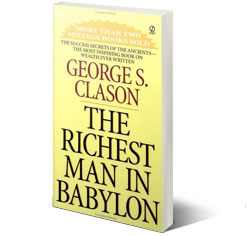
The Richest Man In Babylon by George S. Clason is a classic financial book that I read several years ago and continue to come back to, as the principles in it remain constant. In fact, many popular finance books such as The Wealthy Barber or The Automatic Millionaire are based on principles from this famous book.
The lessons and principles in The Richest Man In Babylon are pretty simple and to the point. However, I found the story to be even more interesting. The book consists of different stories back in the Babylonian days. One in particular, of a slave that was in debt and extremely poor, who sought out the rich to learn the wisdom and knowledge on how to become wealthy.
The lessons which he had learned and applied to his life were remarkable, and this slave had managed to turn his life around by applying the principles and lessons he had learned. He had documented everything he had learned and his progress on clay tablets, which were later found in the 1930's by archaeologists and professors at a university. These professors had then learned of these principles and applied them to their own lives, to also become wealthy and financially abundant.
Whether the stories are true or not, I found them very fascinating.
Here are some of the lessons mentioned:
1- Only seek advice from those that are wise and knowledgeable on the subject.
“Counsel with wise men. Seek the advice of men whose daily work is handling money. Let them save you from such an error as I myself made in entrusting my money in the judgment of Azmur, the brickmaker. A small return and a safe one is far more desirable than risk.”
2- Pay yourself first. Save 10% or 1/10th of whatever you earn.
“‘I found the road to wealth when I decided that a part of all I earned was mine to keep.'
‘But all I earn is mine to keep, is it not?', I demanded.
‘Far from it,' he replied. ‘Do you not pay the garment-maker? Do you not pay the sandal-maker? Do you not pay for the things you eat? Can you live in Babylon without spending? What have you to show for your earnings of the past month? What for the past year? Fool! You pay to everyone but yourself. Dullard, you labor for others. As well be a slave and work for what your master gives you to eat and wear. If you did keep for yourself one-tenth of all you earn, how much would you have in ten years?' “
3- Good luck can be enticed by accepting opportunity.
“Those eager to grasp opportunities for their betterment, do attract the interest of the good goddess. She is ever anxious to aid those who please her. Men of action please her best.
Action will lead thee forward to the successes thou dost desire.”
“Men of Action Are Favored By the Goddess of Good Luck.”
4- “Better a Little Caution Than a Great Regret.”
5- “We Cannot Afford to be Without Adequate Protection.”
6- “Where the Determination Is, the Way Can Be Found.”
7- Seven-tenths or 70% of what you earn goes towards supporting yourself and your family.
“Therefore seven-tenths of all I earn shall be used to provide a home, clothes to wear, and food to eat, with a bit extra to spend, that our lives be not lacking in pleasure and enjoyment.”
8- Two-tenths or 20% goes towards paying off any debt.
“The plan doth provide that out of my earnings my debts shall be paid.
Therefore each time the moon is full, two-tenths of all I have earned shall be divided honorably and fairly among those who have trusted me and to whom I am indebted. Thus in due time will all my indebtedness be surely paid.”
You may have heard of many of these lessons from other financial books, but know that most of them originated from The Richest Man In Babylon. In fact, in the Millionaire Mind Intensive they talk about allocating your money in a similar way that George Clason mentions here. Either way, it's good to hear them again and again to remind yourself of these age-old principles. You may know something intellectually, but DOING it is a whole different story.
Check out more about The Richest Man In Babylon by George S. Clason from Amazon by clicking here.

